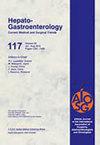Surgery of upper GI gastrointestinal stromal tumors: our experience, prognostic analysis.
引用次数: 2
Abstract
BACKGROUND/AIMS To review our treatment experience of gastrointestinal stromal tumors (GISTs) of the upper gastrointestinal tract and identify the prognostic factors that influence tumor recurrence. METHODOLOGY Data of 46 consecutive patients with upper GI GISTs who underwent surgery from 1988 to 2011 were reviewed. The overall and disease-free survival rates and influence of clinicopathologic variables on disease-free survival rate were evaluated. RESULTS The median age was 64 years (range, 20-86 years). R0 resections were performed in 43 (93.5%) patients. With a median follow-up time of 33 months (1-275 months), there were 5 (10.9%) recurrences and 2 mortalities in the high-risk group. The overall survival and recurrence-free survival rates at 5 years were 92.1% and 84.6%, respectively. Male gender, tumor size of >10 cm, high numbers of mitotic figures, R1 resection, high risk according to the Joensuu criteria, and a Ki-67 index of >10% were associated with a poor prognosis. CONCLUSIONS Surgical resection of low- and intermediate-risk GISTs has excellent results. High counts of mitotic figures, male gender, incomplete resection, large tumor size, and a high Ki-67 index are associated with a poor prognosis.上消化道间质瘤的手术治疗:经验及预后分析。
背景/目的回顾上胃肠道间质瘤的治疗经验,探讨影响肿瘤复发的预后因素。方法回顾性分析1988 ~ 2011年连续行手术治疗的46例上消化道gist患者的资料。评估总生存率和无病生存率以及临床病理变量对无病生存率的影响。结果患者中位年龄64岁(范围20 ~ 86岁)。43例(93.5%)患者行R0切除。中位随访时间为33个月(1 ~ 275个月),高危组复发5例(10.9%),死亡2例。5年总生存率和无复发生存率分别为92.1%和84.6%。男性、肿瘤大小为> ~ 10cm、有丝分裂象数量多、R1切除、Joensuu标准高风险、Ki-67指数>≥10%与预后不良相关。结论手术切除低、中危间质间质瘤效果良好。有丝分裂象数高、男性、切除不全、肿瘤大小大、Ki-67指数高与预后不良有关。
本文章由计算机程序翻译,如有差异,请以英文原文为准。
求助全文
约1分钟内获得全文
求助全文
来源期刊

Hepato-gastroenterology
医学-外科
自引率
0.00%
发文量
1
审稿时长
1.9 months
期刊介绍:
Hepato-Gastroenterology has been discontinued as of 2015. Extremely limited quantities of back issues in print available for sale.
 求助内容:
求助内容: 应助结果提醒方式:
应助结果提醒方式:


